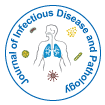开放获取期刊获得更多读者和引用
700 种期刊 和 15,000,000 名读者 每份期刊 获得 25,000 多名读者
抽象的
Dengue Fever Unmasking the Four Serotypes of the Virus
Hannah Andrews
Dengue fever, often referred to simply as dengue, is a mosquito-borne viral infection that affects millions of people worldwide, particularly in tropical and subtropical regions. This disease is caused by the dengue virus, which is transmitted to humans primarily through the bite of infected female Aedes mosquitoes, primarily the Aedes aegypti mosquito. Dengue fever is a significant global health concern due to its widespread prevalence and potential for severe illness. The virus exists in four distinct serotypes (DENV-1, DENV-2, DENV-3, and DENV-4), and infection with one serotype does not provide immunity against the others. In fact, subsequent infections with different serotypes can increase the risk of severe dengue, also known as dengue hemorrhagic fever or dengue shock syndrome.

 English
English  Spanish
Spanish  Russian
Russian  German
German  French
French  Japanese
Japanese  Portuguese
Portuguese  Hindi
Hindi